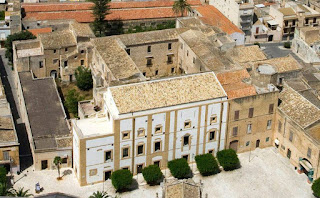 |
| DIA Seizing Gianfranco Becchina assets in 2017 |
Italy's Direzione Investigativa Antimafia, the country's Anti-Mafia Investigation Department has issued a confirmation confiscation decree based upon a request from the Public Prosecutor's Office of Palermo. As per this decree, this action finalises the 2017 confiscation of a significant portion of movable, real estate and corporate assets "attributable to a well-known international trader of works of art art and artefacts of historical-archaeological value" long suspected to have links with the Sicilian mafia, in and around the port town of Trapani.
While the DIA's announcement didn't name the, now, 83 year old dealer living in Castelvetrano, the regional newspapers in Sicily, and the national newspaper in Rome, did.
For decades the Trapani branch of the Cosa Nostra is believed to have accumulated at least some portions of its wealth through the proceeds of illicit archaeological finds. Some of which, according to Italy's DIA may have been procured through grave robbers working at the isolated Archaeological Park of Selinunte, one of Sicily's great ancient Greek cities, located near Castelvetrano probably in the service of the Cosa Nostra. This archaeological site covers some 40 hectares and includes Greek temples, ancient town walls, and the ruins of residential and commercial buildings from Italy's past. Given its remote location, much of the site has not been formally excavated, and it has been prey to opportunistic looters for decades.
To further dismantle the mafia's operational funding in and around Trapani, in November 2017 Italy's Anti-Mafia Investigative Directorate, through the Court of Trapani's penal and preventive measures section, filed an initial seizure order for all movable assets, including real estate and corporate enterprises attributable to Gianfranco Becchina on the basis of an order issued from the District Attorney of Palermo based upon investigations conducted by the DIA, under the coordination of the Palermo Public Prosecutor's Office on the basis that much of Becchina's accumulated wealth was generated through the proceeds of trafficked antiquities.
 |
| Palazzo dei Principi Tagliavia-Aragona-Pignatelli |
The preliminary 2017 order included the seizure of Becchina's cement trade business, Atlas Cements Ltd., Olio Verde srl., his signature olive oil production company, Demetra srl., Becchina & company srl. Real estate holdings confiscated included some 38 buildings as well as Becchina's portions of Palazzo dei Principi Tagliavia-Aragona-Pignatelli, once the noble residence of the family Tagliavia-Aragona-Pignatelli, which is part of the ancient Castello Bellumvider, (an additional part of this palazzo is owned by the city of Castelvetrano and houses the town hall). Investigators also seized a total of 24 parcels of land belonging to Becchina, and four vehicles. In total, the value of the seized assets is estimated to be worth more than 10 million euros.
Giovanni Franco Becchina (b. 1939) was born in Sicily. In the 1970s, he established a business, Palladion Antike Kunst, in Basel, Switzerland, with his wife Ursula. For almost forty years Becchina headed one of Italy's most notorious “cordata” (a trafficking cell) in a lucrative criminal enterprise that used gangs of tombaroli to loot carefully chosen and insufficiently guarded archaeological sites throughout southern Italy.
It is well-documented that Becchina and other traffickers like him, laundered their looted antiquities through exhibitions at museums and in private collections with manufactured provenance, providing a thin veneer of respectability to material removed from Italy and laundered through the ancient art market.
In 2001, Becchina was arrested in Italy and charged with receiving stolen goods, illegally exporting goods, and conspiring to traffic goods. In May 2002, the Swiss and Italian authorities raided Palladion Antike Kunst and three of Becchina’s located storage facilities. A fourth was raided in 2005.
In 2011, Judge Rosalba Liso dismissed the charges of receiving stolen goods, illegally exporting goods, and conspiring to traffic goods, due to the expiration of the statute of limitations. However, the Judge in the case confirmed the seizure order for the 5,919 antiquities Becchina had in stock at the time the 2002 and 2005 search warrants were executed. Material evidence obtained during these seizures confirmed that Becchina bought antiquities directly from tombaroli. Over 90% came from a single source: convicted tombarolo (and later a capo squadra in his own right) Raffaele Monticelli.

